

Don't Just Ditch The Scale, Bash It It seems like everything we do lately is controversial.
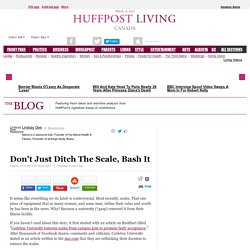
Most recently, scales. That one piece of equipment that so many women, and some men, define their value and worth by has been in the news. Why? Because a university (*gasp) removed it from their fitness facility. If you haven't read about this story, it first started with an article on Breitbart titled "Carleton University removes scales from campus gym to promote body acceptance. " The Carleton University campus sign is pictured in Ottawa, Ontario. My question is why? Why the effort to minimize rape culture only proves that it does exist. A recent op-ed published by the Ottawa Citizen argued that student and faculty group efforts to have Carleton University acknowledge that rape culture exists on campus constituted “propaganda aimed at convincing them the campus is rife with sexual predators.”
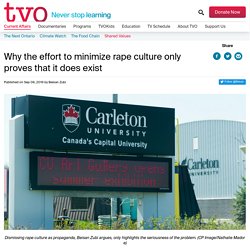
The author, Robert Sibley, argues that it is not “reasonable” or “responsible” to claim the culture at Carleton is a rape culture, and that the call to acknowledge sexual assault as an issue on campus is “intellectually fraudulent and tantamount to moral blackmail.” I don’t think the author set out to prove the existence of rape culture in his piece — but that’s exactly what he did. In his column, Sibley operates with a standard definition of rape culture, a system in which he describes “dominant ideas, social practices, media images and societal institutions implicitly or explicitly condone sexual assault by normalizing or trivializing male sexual violence.” Are Male Athletes More Likely to Rape? Carleton profs decry process around sexual violence policy. More than 20 Carleton University professors signed a letter addressed to the university’s president this spring, expressing their concern that its sexual violence prevention policy could “embarrass” the university unless improvements were made to the process.
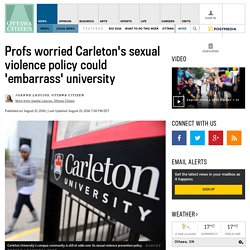
In the strongly worded May 6 email to Roseann Runte, 23 faculty members in the department of sociology and anthropology said they had been kept in the dark about the process and were not offered an opportunity to contribute, even though there are many academics with relevant expertise. “We have received no information through Carleton University channels about the process itself, or about who is involved in the policy development,” said the email, acquired though a freedom-of-information request. “Nor have we been informed about how or when the views of the wider Carleton community will be solicited, or received information about how those broader community views will influence the development of the policy. Riggs resigned on May 16. “The Meaning of Confederalism” by Murray Bookchin.
Few arguments have been used more effectively to challenge the case for face-to-face participatory democracy than the claim that we live in a “complex society.”
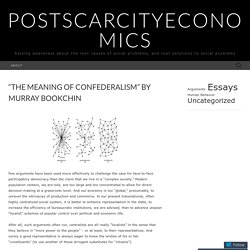
Modern population centers, we are told, are too large and too concentrated to allow for direct decision-making at a grassroots level. And our economy is too “global,” presumably, to unravel the intricacies of production and commerce. In our present transnational, often highly centralized social system, it is better to enhance representation in the state, to increase the efficiency of bureaucratic institutions, we are advised, than to advance utopian “localist” schemes of popular control over political and economic life. After all, such arguments often run, centralists are all really “localists” in the sense that they believe in “more power to the people” – or at least, to their representatives. But face-to-face democracy? Silenced at Carleton U — School of Journalism must apologize for shameful threats against students - Dean Tester. Once again, I am utterly ashamed of my alma mater, and specifically, the School of Journalism and Communications at Carleton University.
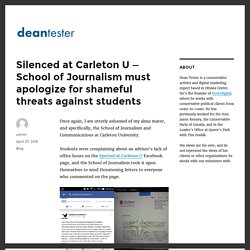
Students were complaining about an advisor’s lack of office hours on the Spotted at Carleton U Facebook page, and the School of Journalism took it upon themselves to send threatening letters to everyone who commented on the page. I hopefully don’t need to point out the irony in the Journalism department trying to stifle freedom of speech. But I am not terribly surprised — while I was a student there, I was constantly told not to write about certain subjects, or that certain viewpoints shouldn’t be given coverage because those people were wrong. In one example, I had a journalism professor compare climate change scientists who disagreed with the IPCC consesus to holocaust deniers — an attack on the National Post, who had just published a series of articles outlining dissenting opinions.